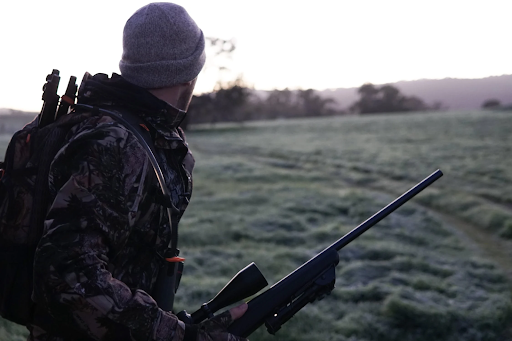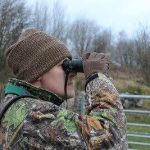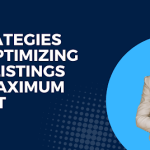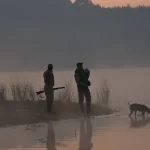People unfamiliar with hunting or newcomers to the sport often underestimate the substantial efforts that all responsible hunters make to maintain ethics.
So, what does it mean to be an ethical hunter? Simply put, ethical hunters protect their own safety, the health of the ecosystem, and the species they love to hunt. When hunters maintain a code of ethics, they promote responsible sporting, no matter their location, weapon of choice, or target species.
In this guide, we’re breaking down hunting ethics in more detail to help newcomers form their own codes of ethics, provide veteran hunters with a resource, and show non-hunters that the sport is deeply rooted in a sense of responsibility.
Table of Contents
Hunting Ethics 101
Whether you use a traditional firearm, a crossbow, an air rifle, or an unconventional weapon — and no matter which species you prefer to hunt — adhering to a code of ethics is key to the hunting experience.
If you’re an experienced hunter, you may not even consider some of your long-standing habits to be rooted in ethics. But, all of the following behaviors and instincts are ethical at their core:
- Maintaining proficiency with your weapon of choice
- Practicing good weapon safety (e.g., muzzle control)
- Taking shots you’re highly confident will be lethal
These are just a few ethical practices that contribute to responsible hunting. And responsibility and ethics go hand-in-hand.
By adhering to a code of ethics, hunters strive to:
- Prioritize their own safety and the safety of other hunters
- Protect wildlife (their target species and other organisms in an ecosystem)
- Positively impact the habitats where they hunt and where their target species live
6 Traits and Behaviors of an Ethical Hunter
What do hunters do to support the three key ethical goals above? Let’s explore some behaviors and traits that responsible hunters adopt to maintain their code of ethics.
#1 Respect for the Ecosystem
At their core, ethical hunters deeply respect the ecosystem — the habitats that they hunt in and the natural world at large.
There are a few ways that hunters show this respect:
- Leaving only footprints – Responsible hunters make an effort to leave the natural domain as pristine as possible. They pick up their trash, only place stands in healthy trees, and remove their tools at the end of the season.
- Respecting boundaries – Responsible hunters only hunt in areas where they’ve been given express permission.
- Developing knowledge – To fill their tags, hunters must develop a strong working knowledge of their hunting area, the animals that live there, and the best ways to protect the habitat.
#2 Discretion
Ethical hunting requires discretion — responsible choices that protect the ecosystem, the target species, and the hunter. Discretion is key to both:
- In the field – Ethical hunters only take shots that they know will be lethal and that are within the capabilities of their weapons of choice. They also fire only in safe directions and keep an eye out for other hunters in the field to prevent injuries.
- At home – Responsible weapon storage, hygienic butchering practices, and weapon maintenance all support safety and success in the field in some way.
While hunters must act quickly to line up shots, they generally don’t make snap decisions. To maintain ethics, hunters take the time to think through their choices and make the ones that protect themselves, other hunters, their target species, and their environment.
#3 Awareness of Regulations
Ethical hunters are both aware of the regulations in their area and respectful of their limits and ramifications. That looks like:
- Hunting target species in their respective seasons
- Using weapons according to regulatory guidelines (e.g., using plugs to follow magazine capacity laws)
- Hunting only in non-prohibited areas
Hunting regulations (especially those related to bag limits) are set by local experts with the population data and ecological knowledge to protect an entire jurisdiction’s population. They work with both qualitative and quantitative data at scale to protect populations at large.
This sense of scale is important. While your lease might be teeming with whitetail, your county or state populations might be low. And, since animals can travel over large distances (especially during mating seasons), acting in the best interest of an entire region is key.
Ethical hunters may certainly question their local regulations. But, they don’t violate them — doing so could be detrimental to the local ecosystem.
#4 Accountability
Ethical hunters take accountability for their actions in a variety of ways:
- Following regulations to a T
- Reporting harvests to contribute to local and regional population data
- Recovering their kills
The last point above is particularly important. Ethical hunters make every possible effort to:
- Take down kills while inflicting as little suffering as possible
- Take shots that they’re confident will be lethal
- Recover the animals they shoot and remove them from the field (or field dress them)
Every hunter has made a bad shot. But, the difference between an ethical hunter and an irresponsible hunter is what they do after taking a bad shot. If you take a shot that hits, but likely won’t be lethal, you should do your best to track the animal, take a lethal shot, and recover it. This can often be a difficult task — and sometimes it proves impossible. But, the responsible hunter does their best to account for every shot they take.
#5 Waste Awareness
Waste awareness is closely related to accountability — if you take down an animal but don’t recover it, your kill was a waste.
Ethical hunters prevent irresponsible waste by recovering their kills whenever possible and making some use of their harvest. That could look like:
- Butchering and eating your harvest
- Giving your harvest to someone else to butcher, eat, or both
- Creating a mount for display
While having fun is certainly a purpose, limiting waste is one way that ethical hunters make the most of their opportunities to harvest their target species. While you may choose not to eat all portions of your kill (or eat them at all, if you choose to mount your harvest), you should make an effort to use what you’ve harvested from the ecosystem.
#6 Openness to Lifelong Learning
Perhaps most importantly, ethical hunters have open minds and are open to lifelong learning and growth. Why?
- Technology is changing – Hunting tools are only becoming more advanced. Optics are improving, ammunition is becoming more specialized, and weapons are only becoming more refined with time. Staying up-to-date on available technologies helps ethical hunters harvest as efficiently and responsibly as possible.
- The climate is changing – Climate change has substantially impacted game animals — they’ve adapted their migration, mating, and eating patterns to account for the changing planet. Learning about these changes can help hunters harvest in a way that benefits the ecosystem at large.
- Hunters change – As they accrue experience and meet other sportsmen, hunters have opportunities to grow and change for the better.
Embracing change and staying up-to-date on developments helps hunters maintain their code of ethics over time, promoting long-term responsibility.
Hunting Ethics Are Paramount to the Sport
Above all else, hunters must behave ethically — in ways that protect themselves, other hunters, their target species, and the habitats where they love to hunt.
While hunters’ individual codes of ethics might be unique, they all strive to achieve all four of these key goals. Maintaining ethics doesn’t just help hunters enjoy their next season; it also helps them preserve opportunities to hunt in the future.



















